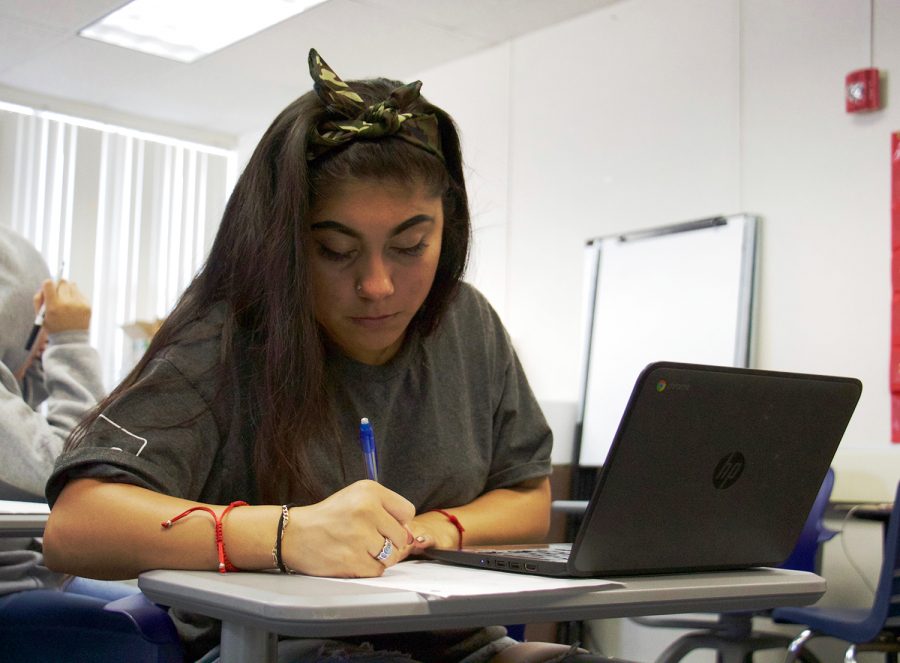Approaching Math With Pragmatism: Review, Resiliency and Financial Literacy
Senior Cristal Acevedo Erostico works on a math problem in Essential Math Concepts. The individually paced course, designed to prepare students for the placement exams required by junior colleges, also incorporates lessons on resiliency and financial literacy into its curriculum. Katrina Arsky.
October 24, 2017
When math teacher Betty Yamasaki heard from junior college representatives that incoming college freshmen tested at a significantly lower level of math than they completed in high school, she started to work on a solution with special education teacher Dan Carter.
“There was this one story of this girl who took calculus here, and she placed at a Geometry level in the placement exam for math at the junior college,” Yamasaki said.
Last year, Yamasaki and Carter introduced the result: a course called Essential Math Concepts. Students planning to enter junior colleges — two-year colleges that offer Associate’s degrees — must take a math placement test to bypass prerequisite classes they already took in high school. The new course aims to help seniors place well in those tests and incorporates lessons on pragmatic skills such as strategies to build resiliency and financial literacy. As far as Yamasaki and Carter know, it’s the first of its kind.
At the beginning of the course, students take a placement exam to determine the concepts they already know. The exam’s results are synchronized with a program called MyFoundations, which presents review topics through videos, practice problems and other learning resources. Students must take a quiz to demonstrate their mastery of each topic.
Students study at their own pace with help from Yamasaki, Carter and two instructional aides along with whole-class review, with a minimum — but often surpassed — requirement of passing one quiz per week.
The teachers rotate through the classroom and help students who are struggling with concepts. They work with students individually or pull together small groups of students struggling with the same concept.
Yamasaki and Carter also select topics to review for the entire class. They assign homework on these topics, typically pre-algebra and algebra concepts, and review the assignment the next day.
“The homework covers the general topics that we think are necessary to be supportive of their general understanding of core topics,” Carter said.
Because Essential Math Concepts is an elective class, Yamasaki and Carter wanted students to get even more out of the course than just being prepared for junior college math placement tests; they wanted their students to be prepared for life beyond high school.
To make sure their students are resilient enough to be successful in the course and beyond, they integrated part of Carter’s resiliency curriculum from his Life Skills class into Essential Math Concepts. The course revolves around self-guided learning and requires returning to topics students may have struggled learning the first time.
“Ninety minutes of straight math is pretty brutal, so I thought ‘Can we break it up and give them stuff that would be applicable to what they’re doing?’” Carter said. “I think so far students look forward to it because it’s something different.
“Sometimes students have never thought about resilience before, but at the end of the year they have their own working definition of resiliency and that in itself is huge.”
To teach resiliency, Yamasaki and Carter discuss stories about students who overcame obstacles. Students learn about aspects of resiliency including relationships and independence in order to understand how to utilize resiliency.
For students, participating in these discussions about resiliency can involve a level of vulnerability not common in other math classes. To make sure their students feel comfortable in the class, Yamasaki and Carter take time to build a community within their classroom. Students share their “chills and thrills” of the weekend every Monday — low points and exciting events that they experienced.
Alongside resiliency, Yamasaki and Carter incorporated another practical life skill into Essential Math Concepts: financial literacy.
“We always hear students say, ‘When are we ever going to do this in real life?’ and so we thought that there’s a need to teach [financial literacy] in this class,” Carter said.
Yamasaki and Carter teach financial literacy second semester through EverFi, an online program where the entire class works at the same pace through modules on credit, taxes and other important financial skills.
In order to better their course, Yamasaki and Carter are trying to figure out how to best seek feedback from students and junior colleges to evaluate and improve it.
“That’s our big goal at the end of the year: how do we know this is working, and if not, how do we improve it?” Carter said.




